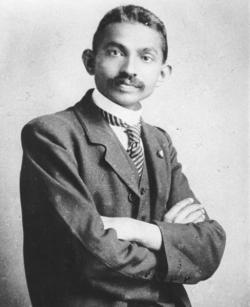
Published date
10 January 1908
On 10 January 1908 Mahatma Gandhi was arrested for the first time in South Africa for refusing to carry an obligatory identity document card commonly known as the 'pass'. Gandhi was released in February after negotiations with the government. A few days later, Gandhi was beaten up and severely injured by a compatriot, who accused him of betraying the Indian cause. In 1906, the Transvaal government promulgated a new Act forcing registration of the colony's Indian population.
At a mass protest meeting held in Johannesburg on 11 September 1906, Gandhi adopted his approach to non-violent protest commonly known as satyagraha (loyalty to the truth) for the first time. He called on his fellow Indians to defy the new law and suffer the punishments for doing so, rather than resist through violent means. This plan was adopted, leading to a seven-year struggle in which thousands of Indians were jailed including Gandhi; some were even shot for striking, refusing to register, burning their registration cards, and engaging in other forms of non-violent resistance.
While the government was triumphant in repressing the Indian protesters, the public outcry stemming from the ruthless methods employed by the South African government in the face of peaceful Indian protesters finally forced South African government under General Jan Christiaan Smuts to negotiate a compromise with Gandhi.
At a mass protest meeting held in Johannesburg on 11 September 1906, Gandhi adopted his approach to non-violent protest commonly known as satyagraha (loyalty to the truth) for the first time. He called on his fellow Indians to defy the new law and suffer the punishments for doing so, rather than resist through violent means. This plan was adopted, leading to a seven-year struggle in which thousands of Indians were jailed including Gandhi; some were even shot for striking, refusing to register, burning their registration cards, and engaging in other forms of non-violent resistance.
While the government was triumphant in repressing the Indian protesters, the public outcry stemming from the ruthless methods employed by the South African government in the face of peaceful Indian protesters finally forced South African government under General Jan Christiaan Smuts to negotiate a compromise with Gandhi.
References
Timelines, 'Mahatima Gandhi is arrested for the first time, for refusing to carry Obligatory ID Card in SA' from Timelines, [online] Available at www.timelines.com [Accessed on 17 November 2010]|
Progress 'Gandhi's Life, Part Six from Progress Report [online] Available at www.progress.org.za [Accessed: 17 November 2010]